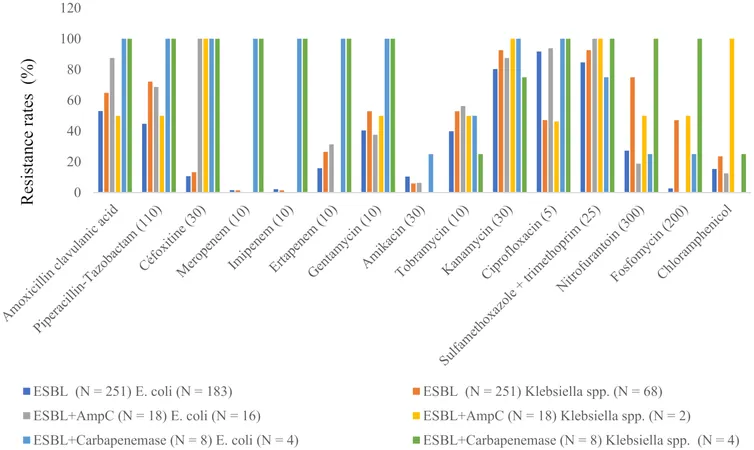
Alarming Findings on Drug-Resistant Bacteria: The Rising Threat of Carbapenemase and AmpC-β-Lactamase Producers in Burkina Faso
2025-01-23
Author: John Tan
Overview of ESBL-PE Infections
In recent years, infections caused by extended-spectrum β-lactamase-producing Enterobacterales (ESBL-PE) have surged in both hospitals and community settings, posing a significant global public health threat, especially in resource-limited areas. These multidrug-resistant (MDR) bacteria were linked to an astonishing 1.27 million deaths worldwide in 2019, with countries in western sub-Saharan Africa reporting death rates exceeding 27 per 100,000 individuals due to these relentless pathogens.
Key Offenders
Among the most notable offenders are E. coli and Klebsiella spp., which are prevalent in the environment and are well-known gut commensal bacteria. Their presence in human feces contributes to further dissemination of antimicrobial resistance (AMR). A key risk factor for colonization by these notorious bacteria is linked to the excessive and often inappropriate use of antibiotics in both human healthcare and veterinary practices, compounded by the alarming rise of counterfeit medications that can thwart effective treatment.
Carriage Rates in the Community
Community carriage rates of ESBL-PE have been documented globally, with Africa showing some of the highest numbers—up to 75% in Tanzania and 45% in Egypt. Recent investigations in Burkina Faso indicated that fecal carriage rates of ESBL-PE among hospitalized patients ranged from an alarming 42% to 55.7%, presenting a crucial public health challenge.
Carbapenemase-Producing Bacteria
The prevalence of carbapenemase-producing bacteria was found to be 2.9% among ESBL-producing isolates. Strikingly, 8 isolates (4 from E. coli and 4 from Klebsiella spp.) produced the New Delhi Metallo-β-Lactamase (NDM)—the only carbapenemase observed in the study. The alarming potential for infection was significantly higher among hospitalized patients and notably in female patients.
AmpC-β-Lactamase Producers
The study also revealed a concerning 6.5% prevalence of AmpC-β-lactamase-producing isolates, with testing indicating that a significant number of patients presenting with drug-resistant bacteria were children under the age of 15. This age group, particularly infants, is especially vulnerable, raising urgent questions about patient care practices and antibiotic stewardship within hospitals.
Antibiotic Resistance Rates
Overall resistance rates to commonly used antibiotics like amoxicillin-clavulanic acid, piperacillin-tazobactam, fluoroquinolones, and sulfonamides were strikingly high. This staggering resistance landscape calls for immediate attention; reports indicated that 92.1% of ESBL-Ec isolates were resistant to ciprofloxacin.
Potential Treatment Options
Despite the alarming data, amikacin and chloramphenicol have emerged as potentially effective treatment options against these resistant strains. However, stakeholders must be made aware of the impending challenge that drug-resistant bacteria pose to healthcare practices and environmental health, prompting the need for robust surveillance systems and effective antibiotic stewardship measures.
Comparison with Other Studies
A significant finding was that high resistances observed were similar to trends reported in other studies across Africa, indicating a widespread crisis. Instead of remaining passive observers to this escalating threat, it is imperative for health authorities in Burkina Faso and other affected regions to implement comprehensive screening protocols for any strains of carbapenemase-producing bacteria, especially upon patient admission.
Conclusion
In conclusion, the situation regarding drug-resistant bacteria in Burkina Faso is becoming critical. The rise of ESBL and carbapenemase-producing strains threatens not only patient safety but also community health standards at large. As these bacteria can be transferred via contaminated food and water sources, proactive measures are essential for curbing their spread—before it's too late! Stay informed, stay vigilant!



 Brasil (PT)
Brasil (PT)
 Canada (EN)
Canada (EN)
 Chile (ES)
Chile (ES)
 Česko (CS)
Česko (CS)
 대한민국 (KO)
대한민국 (KO)
 España (ES)
España (ES)
 France (FR)
France (FR)
 Hong Kong (EN)
Hong Kong (EN)
 Italia (IT)
Italia (IT)
 日本 (JA)
日本 (JA)
 Magyarország (HU)
Magyarország (HU)
 Norge (NO)
Norge (NO)
 Polska (PL)
Polska (PL)
 Schweiz (DE)
Schweiz (DE)
 Singapore (EN)
Singapore (EN)
 Sverige (SV)
Sverige (SV)
 Suomi (FI)
Suomi (FI)
 Türkiye (TR)
Türkiye (TR)
 الإمارات العربية المتحدة (AR)
الإمارات العربية المتحدة (AR)